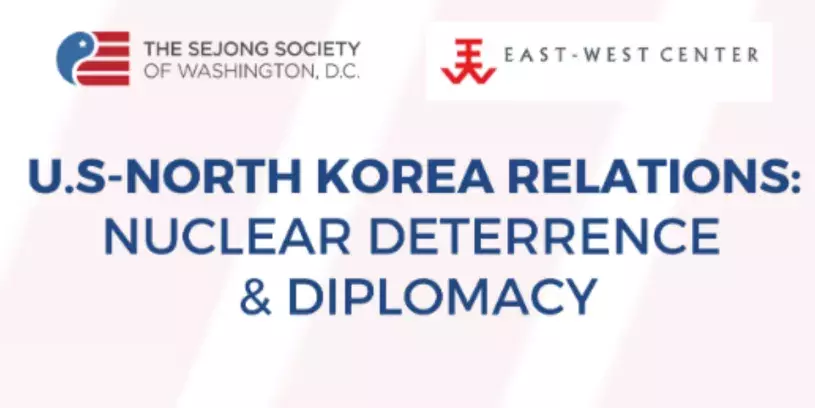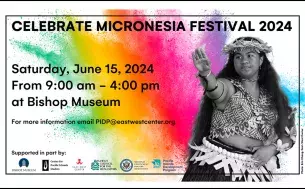
OFFICE/DEPARTMENT
Add to Calendar
The Sejong Society, in partnership with the East-West Center in Washington, presents
US-North Korea Relations: Nuclear Deterrence
A conversation with:
Frank Aum
Senior Expert, Northeast Asia
US Institute of Peace
Markus Garlauskas
Director, Indo-Pacific Security Initiative
The Korea Society
Jenny Town
Director, Korea Program
Stimson Center
Jonathan Corrado (Moderator)
Director, Policy
The Korea Society
Five years after the US-North Korea summit in Hanoi, diplomacy between Washington and Pyongyang remains frozen. Chairman Kim Jong Un currently ignores entreaties from the Biden administration despite its continuation of his predecessor’s call for negotiations without preconditions. At the same time, North Korea has expanded its relationship with Russia and reaffirmed its cooperation with China. On the other hand, the United States has moved to strengthen its alliance with South Korea, particularly under the leadership of President Yoon Suk Yeol. What can the United States do to engage North Korea on any of the many disagreements they have on the Korean Peninsula? How should we evaluate the diplomatic space North Korea is operating in? How does North Korea see the stability and security of the Indo-Pacific region?
SPEAKER BIOGRAPHIES

Frank Aum is the senior expert on Northeast Asia at the U.S. Institute of Peace. He focuses on ways to strengthen diplomacy to reduce tensions and enhance peace and stability on the Korean Peninsula. From 2010 to 2017, he worked at the Department of Defense, including as special counsel to the Army General Counsel, special assistant to the assistant secretary of defense for Asian and Pacific Security Affairs, and senior advisor on North Korea in the Office of the Secretary of Defense.

Markus Garlauskas is the director of the Indo-Pacific Security Initiative of the Scowcroft Center for Strategy and Security. He leads this new initiative’s efforts focused on security, prosperity, and freedom in the Indo-Pacific region. He led projects focused on deterrence and defense issues in East Asia as a nonresident senior fellow from August 2020 until assuming his duties as director in January 2023.

Jenny Town is a Senior Fellow at the Stimson Center and the Director of Stimson’s Korea Program and 38 North. Her areas of expertise include North Korea, U.S.-DPRK relations, U.S.-ROK alliance relations, and Northeast Asia regional security. She holds a BA in East Asian Studies and International Relations from Westmar University and a Master of International Affairs from the Columbia University School of International and Public Affairs.

Jonathan Corrado is Director of Policy for The Korea Society. He produces programming and conducts research on a range of security, diplomacy, and socioeconomic issues impacting the U.S.-Korea Alliance, the Korean Peninsula, and Northeast Asia. He teaches a class titled, “North Korea: State, Society, Diplomacy, and Security” at The School of International and Public Affairs (SIPA) at Columbia University and SUNY Stony Brook University.

The views expressed by this event's participants do not necessarily reflect those of the East-West Center.
The Sejong Society, in partnership with the East-West Center in Washington, presents
US-North Korea Relations: Nuclear Deterrence
A conversation with:
Frank Aum
Senior Expert, Northeast Asia
US Institute of Peace
Markus Garlauskas
Director, Indo-Pacific Security Initiative
The Korea Society
Jenny Town
Director, Korea Program
Stimson Center
Jonathan Corrado (Moderator)
Director, Policy
The Korea Society
Five years after the US-North Korea summit in Hanoi, diplomacy between Washington and Pyongyang remains frozen. Chairman Kim Jong Un currently ignores entreaties from the Biden administration despite its continuation of his predecessor’s call for negotiations without preconditions. At the same time, North Korea has expanded its relationship with Russia and reaffirmed its cooperation with China. On the other hand, the United States has moved to strengthen its alliance with South Korea, particularly under the leadership of President Yoon Suk Yeol. What can the United States do to engage North Korea on any of the many disagreements they have on the Korean Peninsula? How should we evaluate the diplomatic space North Korea is operating in? How does North Korea see the stability and security of the Indo-Pacific region?
SPEAKER BIOGRAPHIES

Frank Aum is the senior expert on Northeast Asia at the U.S. Institute of Peace. He focuses on ways to strengthen diplomacy to reduce tensions and enhance peace and stability on the Korean Peninsula. From 2010 to 2017, he worked at the Department of Defense, including as special counsel to the Army General Counsel, special assistant to the assistant secretary of defense for Asian and Pacific Security Affairs, and senior advisor on North Korea in the Office of the Secretary of Defense.

Markus Garlauskas is the director of the Indo-Pacific Security Initiative of the Scowcroft Center for Strategy and Security. He leads this new initiative’s efforts focused on security, prosperity, and freedom in the Indo-Pacific region. He led projects focused on deterrence and defense issues in East Asia as a nonresident senior fellow from August 2020 until assuming his duties as director in January 2023.

Jenny Town is a Senior Fellow at the Stimson Center and the Director of Stimson’s Korea Program and 38 North. Her areas of expertise include North Korea, U.S.-DPRK relations, U.S.-ROK alliance relations, and Northeast Asia regional security. She holds a BA in East Asian Studies and International Relations from Westmar University and a Master of International Affairs from the Columbia University School of International and Public Affairs.

Jonathan Corrado is Director of Policy for The Korea Society. He produces programming and conducts research on a range of security, diplomacy, and socioeconomic issues impacting the U.S.-Korea Alliance, the Korean Peninsula, and Northeast Asia. He teaches a class titled, “North Korea: State, Society, Diplomacy, and Security” at The School of International and Public Affairs (SIPA) at Columbia University and SUNY Stony Brook University.

The views expressed by this event's participants do not necessarily reflect those of the East-West Center.














